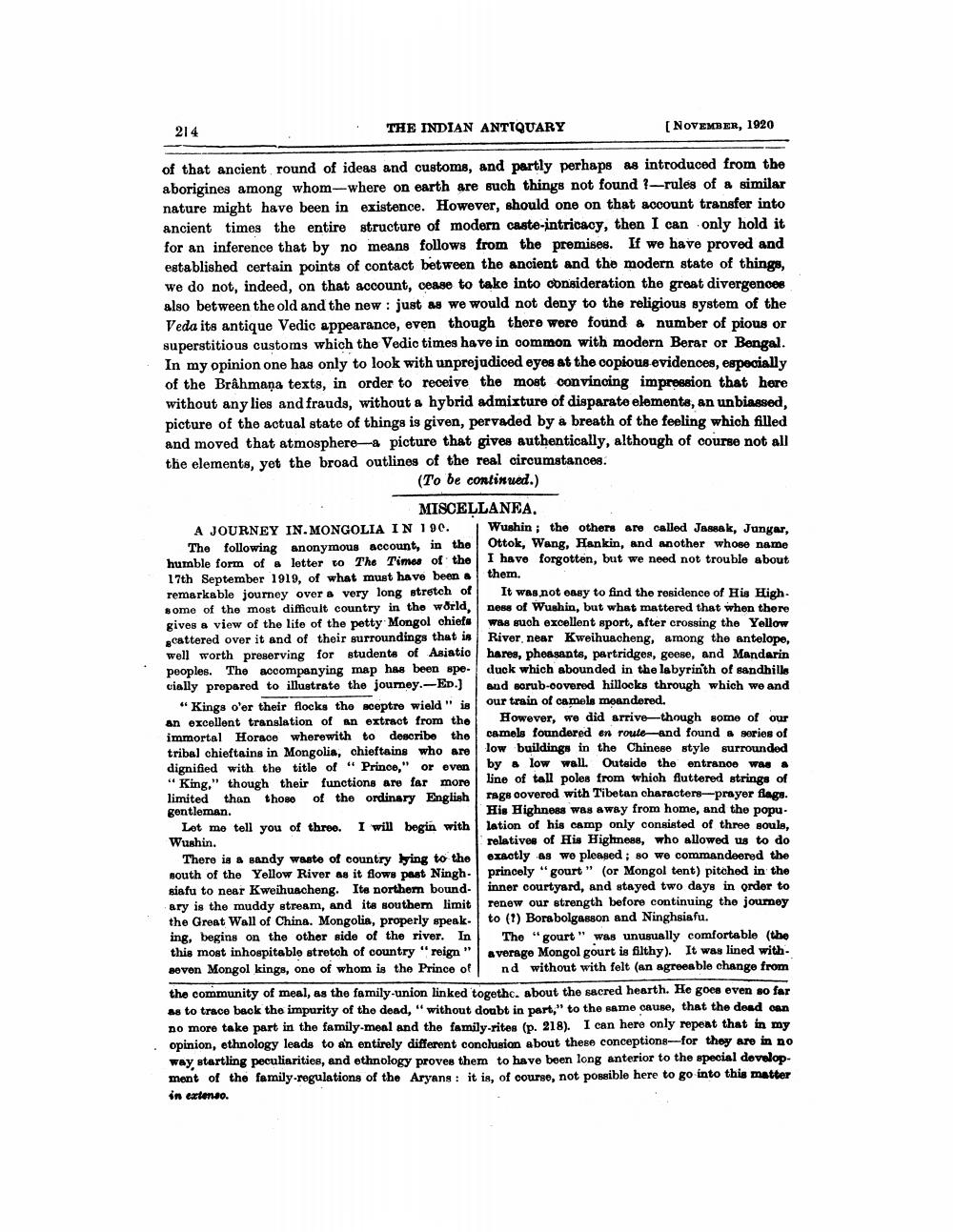________________
214
THE INDIAN ANTIQUARY
(NOVEMBER, 1920
of that ancient round of ideas and customs, and partly perhaps as introduced from the aborigines among whom-where on earth are such things not found 1-rules of a similar nature might have been in existence. However, should one on that account transfer into ancient times the entire structure of modern caste-intricacy, then I can only hold it for an inference that by no means follows from the premises. If we have proved and established certain points of contact between the ancient and the modern state of things, we do not, indeed, on that account, cease to take into consideration the great divergences also between the old and the new : just as we would not deny to the religious system of the Veda its antique Vedic appearance, even though there were found a number of pious or superstitious customs which the Vedic times have in common with modern Berar or Bengal. In my opinion one has only to look with unprejudiced eyes at the copious evidences, especially of the Brâhmaņa texts, in order to receive the most convincing impression that here without any lies and frauds, without a hybrid admixture of disparato elements, an unbiased, picture of the actual state of things is given, pervaded by a breath of the feeling which filled and moved that atmosphere a picture that gives authentically, although of course not all the elements, yet the broad outlines of the real circumstances.
(To be continued.)
MISCELLANEA. A JOURNEY IN MONGOLIA IN 190. Wushin; the others are called Jassak, Jungar,
The following anonymous account, in the Ottok, Wang, Hankin, and another whose name humble form of a letter to The Times of the I havО forgotten, but we need not trouble about 17th September 1919, of what must have been them. remarkable journey over a very long stretch of It was not easy to find the residence of His Highsome of the most difficult country in the world, I ness of Wushin, but what mattered that when there gives a view of the lite of the petty Mongol chief was such excellent sport, after crossing the Yellow scattered over it and of their surroundings that is River, near Kweihuacheng, among the antelope, well worth preserving for students of Asiatio hares, pheasants, partridges, geese, and Mandarin peoples. The accompanying map has been spe-duck which abounded in the labyrinth of sandhills cially prepared to illustrate the joumey.--Ed.) and sorub-covered hillocks through which we and
"Kings o'er their flocks tho aceptre wield" is our train of camels moandered. an excellent translation of an extract from the However, we did arrive-though some of our immortal Horace wherewith to describe the camels foundered en route and found series of tribal chieftains in Mongolia, chieftains who are low buildings in the Chinese style surrounded dignified with the title of Prince," or even by a low wall. Outside the entrance W . "King," though their functions are far more line of tall poles from which fluttered strings of limited than those of the ordinary English
raga covered with Tibetan characters-prayer flags. gentleman.
His Highness was away from home, and the popu. Lot me tell you of three. I will begin with lation of his camp only consisted of three souls,
relatives of His Highness, who allowed us to do There is a sandy waste of country lying to the exactly as we pleased; so we commandeered the south of the Yellow River as it flows past Ningh- princely "gourt" (or Mongol tent) pitched in the kiafu to near Kweihuacheng. Its northern bound inner courtyard, and stayed two days in order to ary is the muddy stream, and its southem limit renew our strength before continuing the joumey the Great Wall of China. Mongolia, properly speak. to (1) Borabolgasson and Ninghsiafu. ing, begins on the other side of the river. In The "gourt" was unusually comfortable (the this most inhospitable stretch of country "reign " average Mongol gourt is Althy). It was lined withBovon Mongol kings, one of whom is the Prince of nd without with felt (an agreeable change from the community of meal, as the family-union linked togethe. about the sacred hearth. He goes even so far as to trace back the impurity of the dead," without doubt in part," to the same cause, that the dead can no more take part in the family meal and the family-rites (p. 218). I can here only repeat that in my opinion, ethnology leads to an entirely different conclusion about these conception--for they are in no way startling peculiarities, and ethnology proves them to have been long anterior to the special develop ment of the family-regulations of the Aryans: it is, of course, not possible here to go into this matter in extenso.
Wushin.




